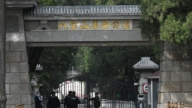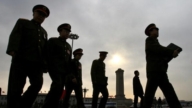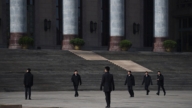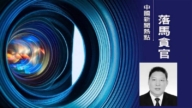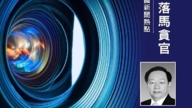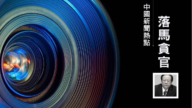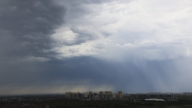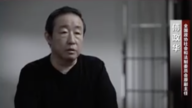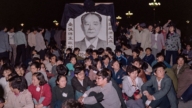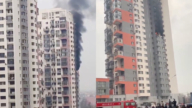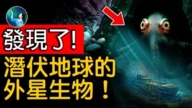【新唐人2012年11月05日訊】一年前,中共總書記胡錦濤曾經談到,中共面臨「精神懈怠、能力不足、脫離群眾、消極腐敗」等「四大危險」。現在18大即將舉行,大陸官媒再次強調這「四大危險」。同時,前中共總書記胡耀邦之子胡德平呼籲深化政改的文章,也出現在報紙頭版。外界分析,這似乎在傳遞著強烈的政改信號,但中共所說的政改和民眾期望的政改卻相差甚遠。下面請看報導。
2號,中共黨媒《新華社》發表文章「挑戰,十八大必須直面的話題」,文中再次強調中共總書記胡錦濤去年(2011年)提出的警告:當前中共面臨「精神懈怠、能力不足、脫離群眾、消極腐敗」等四大危險。報導聲稱,中國社會目前正處於「矛盾凸顯期」,中共政權「面對前所未有的挑戰」,「來自外部的風險前所未有」。中共18大必須面對外交壓力、經濟放緩、分配不均等執政難題。
最新一期中共機關刊物《求是》也指出,對於中共來說,今後「兩難」選擇,日益增多。
而就在1號,北京「十八大新聞中心」《新華社》圖片服務處,展出了一張1982年中共12大的舊照,被視為中共體制內開明派代表人物的中共前任總書記胡耀邦和趙紫陽,雙雙出現在照片中。
3號,北京《經濟觀察報》又在頭版刊登前胡耀邦之子、全國政協常委胡德平的文章,呼籲中共深化政改、實施憲政法治。胡德平表示,要破除國有企業的壟斷,讓民營企業逐步進入壟斷行業,公平競爭。胡德平還以「文革」教訓為例,呼籲當局推動憲法的實施。
大陸當局這一系列舉措,引來外界關注與猜測,認為這是在釋放強烈的政改信號。當局希望通過再次推出擁有一定民望的已故領導人胡耀邦、趙紫陽,來解決中共當前面臨的空前執政危機。
但時政評論員藍述向《新唐人》分析指出,當年胡耀邦、趙紫陽在共產黨體制內進行的有限政改,曾經在當時有過一定積極意義,但在今天已經遠遠落後於時代。
時政評論員藍述:「他們所做的所有改革,歸根結底就是一句話,就是:改變共產黨的執政方式,而不改變共產黨的執政地位。而恰恰是中共這個獨裁的執政地位,是中國社會現在面臨的一切問題的核心。」
藍述強調,這樣類似的改革,無非是做做樣子、新鮮一陣而已,不會起到實質作用。
北京國情內參首席研究員鞏勝利也指出,任何政黨都要解決一個「合法化」的問題,但中共民心盡失,「執政合法性」受到全世界的質疑。
北京國情內參首席研究員鞏勝利:「合法化很簡單,就是要老百姓來舉手站隊,(看)站在誰的一方。你比如說,現在中國媒體也經常搞老百姓的支持率,但是它不搞一個中國共產黨的支持率,從來沒有搞過一次。」
鞏勝利強調,中共一開始曾經矇騙了民眾,但現在基本上老百姓都已經看明白:中共只關心自己手中的權力,所謂堅持「中國特色社會主義」,完全是為了中共這個集團的利益。
採訪/劉惠 編輯/李謙 後製/周天
CCP Regime’s Four Major Dangers Once Again Published
One year ago, Hu Jintao, General Secretary of the Chinese
Communist Party (CCP), warned of four major dangers.
As the 18th Party Congress is upcoming, CCP official media
has once again stressed the four major dangers.
Meanwhile, former CCP leader Hu Yaobang’s son openly
appealed to the authorities to deepen political reform.
Analysts think these facts seem to give a strong signal of
the CCP launching reforms.
However, the political reform alleged by the CCP is far
different from the general public’s real expectation.
On November 2, the CCP official newspaper,
Xinhua News Agency,
issued an article about challenges
the 18th Party Congress faces.
It highlighted a warning made by Hu Jintao in 2011.
Hu warned of four major dangers existing within the CCP:
spiritual slackness, incompetence, losing contact with the
general public, inactivity and corruptibility”.
The news report alleged that China is “in a period
during which conflicts are increasingly showing themselves
and that the CCP regime faces “unprecedented challenges”
and “unprecedented crises arising from external sources.”
It also claimed that the18th Party Congress has to face
tough issues including diplomatic pressure, economic slowdown, and social inequality.
The latest issue of Qiu Shi magazine, official publication of
CCP Central Committee, said that in the near future,
the regime’s “dilemma of choice” will grow.
On November 1, the 18th Party Congress’ news center
exhibited an old photo taken at the 12th Party Congress in 1982.
The photo showed Hu Yaobang and Zhao Ziyang,
both were representatives of the CCP liberal faction.
On November 3, the Economic Observer,
a weekly newspaper based in Beijing, published Hu Deping’s article on the front page.
Hu Deping, Hu Yaobang’s son, is the Standing Committee
member of the CCP National Political Consultative Conference.
Hu Deping called on the CCP to deepen political reform,
and introduce constitutional democracy under the rule of law.
In his article, Hu Deping said that it should break up
state-owned enterprises’monopolies.
And that it should offer private enterprises open access
to monopoly industries for fair competition.
Hu Deping took the Cultural Revolution for example,
urging the regime to advance application of the Constitution.
A swathe of official initiatives have drawn
pubic attention and speculation.
They regard official actions as a strong signal
of a launch of possible political reform.
The authorities are deemed to want to resolve the
unprecedented ruling crisis by once again introducing Hu Yaobang and Zhao Ziyang.
Both Hu and Zhao, the late CCP leaders,
were known to have a high level of public support.
Critic Lan Shu comments on the political reforms
launched by Hu Yaobang and Zhao Ziyang.
The reforms did create positive impact at that time,
but they were limited, he says.
And today the reforms have lagged
far behind those of the era in mention.
Lan Shu: “All reforms they made, in short, were changes in
the CCP’s way of ruling, instead of changes in its ruling status.
But the CCP’s autocratic rule is the core of all the
problems that plague today’s China."
Lan Shu indicates that reforms like these are just a pose.
And that they won’t achieve any real effect.
Gong Shengli, chief researcher of Beijing-based periodical
“China Realities Insight”, comments on all this.
Gong said that any ruling political party is bound to
justify its “legitimacy”.
However, the CCP has now lost all public confidence,
and “the legitimacy of its reign” has been the subject of suspicion in the world.
Gong Shengli: “It’s very simple to make its reign legitimate.
Just allow the populace to vote.
For example, China’s media often conducts polls for
approval rating.
But they never do polls for the popularity rating of the CCP.”
Gong Shengli remarks that the CCP have
deceived the public from the very beginning.
So far, the general publics have basically discerned the truth.
The regime only cares about its ruling power.
It has insisted in following
“socialism with Chinese characteristics”, which is solely
for satisfying the interests of the CCP, he says.


